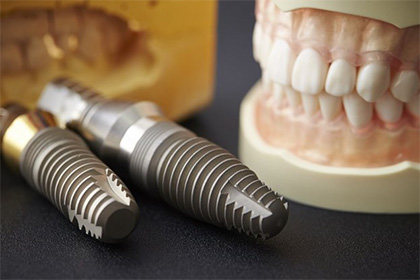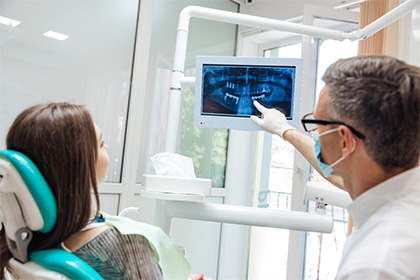Over 95% of dental implant cases are consistently successful, producing beautiful and long-term results. However, there are rare cases where dental implant failure occurs. Since the chances of it happening are so low, it’s not typically something to be concerned about. Of course, it’s still a good idea to be aware of why it happens, how to recognize the symptoms, and which treatments can save your smile. If you’re concerned about the health of your implants or would like to learn more about your salvage options, continue reading or give our office a call today.
Dental Implant Salvage And Failure
Saving Your Newly Rebuilt Smile
Why Do Dental Implants Fail?
The most common cause of dental implant failure is an infection known as peri-implantitis. When bacteria attack the tissue around the implant, it can be detrimental, causing serious damage. If left untreated, the jawbone and connective tissue will eventually deteriorate and lose their ability to support the implant. Although lack of diligence in oral hygiene is often the reason why peri-implantitis occurs, there are many other factors that contribute as well.
Some other issues that can lead to dental implant failure include:
- Failed osseointegration (when the implant and jawbone don’t successfully integrate)
- Physical trauma
- Medical conditions (i.e., cancer and other diseases that interfere with the body’s ability to support dental implants)
Symptoms of a Failed Dental Implant
It’s worth noting that dental implant failure can occur at any time. Early failure happens shortly after dental implant placement surgery, while late failure can develop anytime after osseointegration. It can even happen years or decades after your treatment!
Keep an eye out for the following signs and symptoms as they can indicate your implant is failing:
- Unusual or severe pain. Although it’s normal to experience some soreness after your oral surgery, your implants should feel comfortable and natural once you heal. If that’s ever not the case, call our office right away.
- Loose dental implant Sometimes a dental implant can feel loose if there’s a problem with the restoration. However, there are instances where it’s because the implant has failed.
- Bleeding, sweeling, and pus. These are signs of an infection, meaning you should seek immediate dental attention.
- Difficulty chewing. Once you’re all healed up, your new smile should be able to withstand the chewing of virtually any food. If you’re having trouble chewing, you should get your implants checked out.
How Dental Implant Salvage Works
Think you’re having issues with your dental implants? Don’t hesitate to get in touch with our team! The sooner you make an appointment, the better. At Lake Nona Dental Group, we’ll thoroughly examine your mouth to identify the underlying problem.
During your appointment, we’ll also about your symptoms and recommend treatment options to get your smile back on the right track. Some common solutions include deep dental cleaning, antibiotics, and other conservative infection control measures.
If your issues are severe, we may have to remove the implant altogether. After addressing the problem with bone grafting, gum disease treatment, or any other service, you may be eligible for a new dental implant. Before moving forward with anything, we’ll discuss your options with you so you know exactly what to expect.
I Need a Checkup & Cleaning I am Concerned About Bleeding Gums I Have a Cavity or Broken Tooth I am Missing One or More Teeth I Want to Enhance My Smile I Want a Straighter Smile I am in Pain & Need Help I Need My Wisdom Teeth Removed I am Concerned about Sleep Apnea View Our Services






